English Influences On American Government
Standard 1.four: British Influences on American Government
Explain how British ideas about and practices of government influenced the American colonists and the political institutions that developed in colonial America. (Massachusetts Curriculum Framework for History and Social Studies) [8.T1.iv]
Focus Question: What Were the Autonomous and Undemocratic Political Practices that Developed in Early Colonial America?
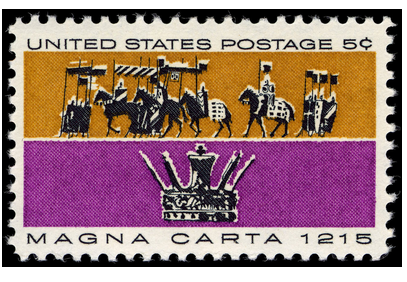
"Magna Carta 5-cent 1965 upshot U.S. postage" | Public Domain
How did experiments in commonwealth and autonomous government that began in the 13 N American colonies connect to mod 24-hour interval United states governmental ideas and practices? The modules in this chapter explore democracy and voting in colonial America, the impact of Anne Hutchinson's religious dissent, and current debates over extending voting rights to sixteen and 17-year-olds.
You can explore this topic further at our wiki page for British Influences on American Government.
Modules for this Standard Include:
- INVESTIGATE: The Mayflower Compact, Colonial Governments, Who Voted in Early America, and a Rebellion Confronting a Rex
- SPECIAL TOPIC BOX: Pirate Democracy in the Atlantic World
- MEDIA LITERACY CONNECTIONS: Media Coverage of Kings, Queens, and Royal Families
- UNCOVER: Lucy Terry Prince, Anne Hutchinson and Mary Dyer: Women's Roles in Colonial America
- Appoint: At What Age Should Teenagers (16-Yr-Olds and/or 17-Year-Olds) Be Allowed to Vote?
1.INVESTIGATE: The Mayflower Compact, Colonial Governments, Who Voted in Early America, and a Rebellion Against a King
The Mayflower Compact
Signed in 1620 past 41 adult male passengers during the 3000-mile sea voyage from Kingdom of the netherlands to constitute a colony in the new world of N America, the Mayflower Compact established a framework for cocky-government amid the colonists.
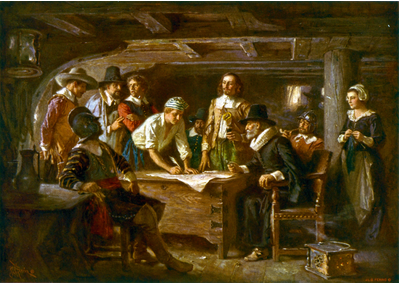
Signing of the Mayflower Compact, 1620
"The Mayflower Compact, 1620" past Jean Leon Gerome Ferris, Public Domain
The Compact has its foundation in the Magna Carta (1215) that established the idea of the dominion of law. The Mayflower Compact asserted information technology was the people, non a king, who made the law. Here is the complete text of the Mayflower Compact.
Betwixt 1636 and 1671, the Plymouth Colony adopted The General Fundamentals of New Plymouth, the first legal code in colonial North America. It included statements about representative government and individual rights. Its first article was a announcement of cocky-rule, stating that the people of the colony:
"Do Enact, Ordain and Constitute; that no Human action Imposition, Police or Ordinance be Made or Imposed upon us now or to come, bur such as shall be Enacted by consent of the body of Freemen or Associates, or their Representatives legally assembled; which is co-ordinate to the gratuitous Liberties of the free born People of England."
Suggested Learning Activities
- Analyze the Historical Evidence
- Were Pilgrims, the original settlers of the Plymouth Colony, autonomous?
- Here are resources to guide the discussion:
- The Mayflower Compact, George Bricklayer Academy
- Mayflower Compact, Constitutional Rights Foundation
- Mayflower and the Mayflower Compact, Plimoth Patuxet Museums
- The Mayflower 2: Design the First Government on Mars
- Imagine a 21st Century Mayflower Spaceship landing on Mars 400 years after the Pilgrims landed in N America. The ship is damaged and cannot return.
- Make decisions about how to govern the new Mars colony and record those decisions in video as well equally a written certificate. The Mayflower Ii learning experience was developed by the Constitutional Rights Foundation.
Colonial Governments
The Virginia House of Burgesses was the start legislative assembly in the American colonies. The assembly met for the showtime time in Jamestown'southward church on July 30, 1619. It had 23 original members, including the colony's governor, all of whom were property-owning white men. It was modeled after the British Parliament and members met annually to vote on taxation and set local laws. Y'all can larn more than from Social Studies for Kids: The Virginia House of Burgesses.
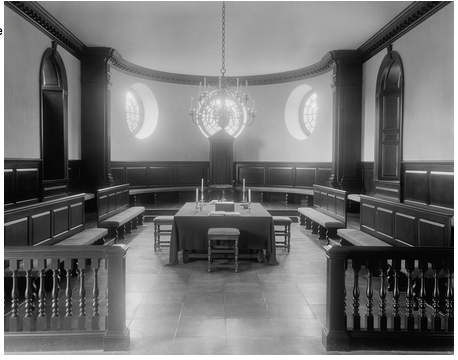
Photo of "Interior of the Virginia Business firm of Burgesses"
by Frances Benjamin Johnston, Public Domain
Many settlements in New England expert authorities through town meetings. Unlike in Virginia where people elected representatives to the House of Burgesses, town meetings were a form of direct democracy. All White men in a community participated in making decisions. You can larn more almost boondocks meetings in Topic half dozen.10 of this book.
The germination of dissimilar forms of colonial government was a step toward autonomous self-government. ThoughtCo.'s Colonial Governments of the Original thirteen Colonies offers a colony-by-colony overview of the beginnings of these governments.
Who Voted in Early America
Voting, though not uniform in every colony, was done by well-nigh 10% of the population. Typically, simply free white, male property owners 21 years of age or older could vote. Such individuals might exist a fellow member of a predominant religious group, or a Freeholder, meaning the person owned land worth a certain amount of money. Slaves, women, Jews, Catholics and men besides poor to be freeholders could not vote (Who Voted in Early America? Constitutional Rights Foundation 1991).
In some places, women who owned property, complimentary Blackness people, and Native Americans could vote, simply these were rare exceptions. New Jersey'south starting time constitution in 1776 gave voting rights to "all inhabitants of this colony, of full age, who are worth fifty pounds … and have resided inside the county … for twelve months" (equally cited in National Park Service, 2018, para. 2). It is unclear how many women actually voted. In 1807, the New Jersey legislature passed a constabulary stating no persons were to be immune to vote except free white men who either owned belongings worth 50 pounds or were taxpayers.
Colonists generally did non vote for their governors, instead they were appointed past the English language king. In Connecticut and Rhode Island, however, voters elected governors. Here is a list of American Colonial Governors.
Pirate Republic in the Atlantic World
The time period from the 1500s to the mid-1800s was a golden historic period of piracy and privateering in the Atlantic globe, and pirates helped England and French republic in their purple competition against Espana in the New World. A pirate is someone who attacks and robs ships at bounding main; a privateer is a privately owned ship engaging in piracy on behalf of a government or country.
Although pirates sought coin and financial proceeds through plunder and violence, they too severely disrupted Spanish trade and shipments of gilt and silver, and in so doing, promoted English and French colonization in North America. For a time, noted history researcher and eye school teacher Jason Acosta (2005), "privateering began as a private venture, became backed by the crown, evolved into a money making scheme, and then led to the success of imperial colonies like Port Royal and Tortuga" (p. 86). Once colonial trade in items like tobacco, coffee, and tea was firmly established and very assisting and competition with Spain lessened, England and France turned to suppressing piracy as a threat to their empires.
Interestingly, Acosta's research uncovered testify of democratic practices on board pirate ships. Utilizing primary sources including pirate charters, travel narratives, court hearings, offset-manus accounts of captives, and sermons delivered at pirate hangings, Acosta establish examples of democracy and separate branches of government on ships. All members of the crew (including Black people and those of dissimilar nationalities) could vote. The helm was elected. The crew functioned like Congress and every bit a jury. The quartermaster served every bit a judge in settling disputes. Injured sailors (such equally loss of an centre or a leg) received financial compensation from the ship's common fund.
Acosta concluded that pirates, who were largely outcasts from club and victims of oppression (including slavery and indentured servitude too as the barbarous treatment of sailors on merchant and naval ships), gravitated toward more egalitarian practices where anybody was treated equally, although ofttimes harshly. While pirate democracy may not accept directly influenced the writing of the Declaration of Independence or the Constitution, it offers another historical example of people seeking to be gratuitous from oppressive rulers and unfair social and economic conditions.
Suggested Learning Activity
- Write a Children's Book
- Write a children's book about pirates and pirate ships which explains how republic works to a younger audience.
What If America Had Chosen a King or Queen, not a President?
The American Revolution was a rebellion against rule by a rex, inspired by the Enlightenment ethics of reason, liberty, and natural rights of mankind. The Founders, noted historian Heather Cox Richardson, rejected the idea that any unmarried individual (a king or queen) had an inherent right to rule others (Letters from an American, Dec 1, 2021). They set forth the revolutionary view that individuals had inalienable rights and government existed based on the consent of the governed, although they failed to extend that vision to include women, people of color, or native peoples.
The Declaration of Independence stated: "Only when a government continually violates the rights of the people, clearly and with the purpose of exercising absolute power over them, the people accept a right and duty to throw off that government. That is exactly what has happened here in British America, and which compels us to throw off the authorities of Smashing Britain. The electric current Rex has continually violated our rights, patently intending to exercise absolute ability over u.s.."
Monarchyis a system of government where a single leader inherits political power by birth and family membership. Mono means one and then a monarch rules for life. Monarch rests on the laws of primogeniture where the eldest kid in a family unit (and and then on in a line of succession) inherits the parent's estate and title. There are famous and infamous monarchs in world history: Henry 8, Louis Fourteen, Peter the Great and many women rulers including Hatshepsut, Nefertiti, Cleopatra, Elizabeth I, Catherine the Groovy, and Queen Victoria (meet Neat Women Rulers).
England had a long history of nobles challenging an all-powerful monarchy, beginning with the Magna Carta and the English language Bill of Rights which ready limits on the power of the Male monarch to human action without the consent of Parliament. Nevertheless, dominion by a monarch, a King or a Queen, has been a dominant form of authorities for centuries; here is a List of Rulers of Europe from the Metropolitan Museum of Art.
There are 29 monarchies ruling 40 countries in the world today, although many of the kings and queens have simply ceremonial functions in constitutional democracies.
Queen Elizabeth II, who was 96 years onetime when she passed on September 8, 2022, was the longest serving monarch, having begun her reign Feb 6, 1952. As Queen she was the head of state for Great Britain, Australia, New Zealand, Canada, Papua New Republic of guinea, Northern Ireland, and the other 14 countries in the Republic Realm. Link here to her Obituary from the New York Times.
Other nations with monarchs include: Saudi Arabia, United Arab Emirates, Bhutan, Oman, Brunei, Cambodia, Luxembourg, Kingdom of belgium, Swaziland, Sweden, Andorra, Qatar, Denmark, Hashemite kingdom of jordan, Vatican City, Morocco, Lesotho, Netherlands, Bahrain, Nihon, Spain, Thailand, Lichtenstein, Monaco, Malaysia, and Kuwait. Some of these monarchs have great power - with the King of Saudi Arabia beingness considered the most powerful absolute monarch in the globe today.
With these facts in mind, read Article i, Section four, Clause VIII from the Constitution. Why do yous think the Founders wanted to make certain that America did not have any titles such as "King" inside the land?
Media Literacy Connections: Media Coverage of Kings, Queens, and Royal Families
Online and print media in this state and around the world devote ongoing and extensive coverage to the English monarchy.
In September 2022, the decease of Queen Elizabeth Ii at age 96 after 70 years on the throne was the focus of multiple stories about her life too equally the ascent of her son to become King Charles Iii, at age 73, the oldest person ever to assume the throne.
In early 2021, Oprah Winfrey's much-anticipated inteview with (Prince) Harry and Meghan Markle aired on television in Great United kingdom of great britain and northern ireland and the United states, creating a huge media event. Online and print media devoted extensive coverage to stories of palace intrigue and family conflict, including revelations near racism within the imperial family. The interview followed Harry'southward and Meghan'south interruption with the royal family in which they voluntarily gave upwards their royal duties and their His/Her Highness titles.
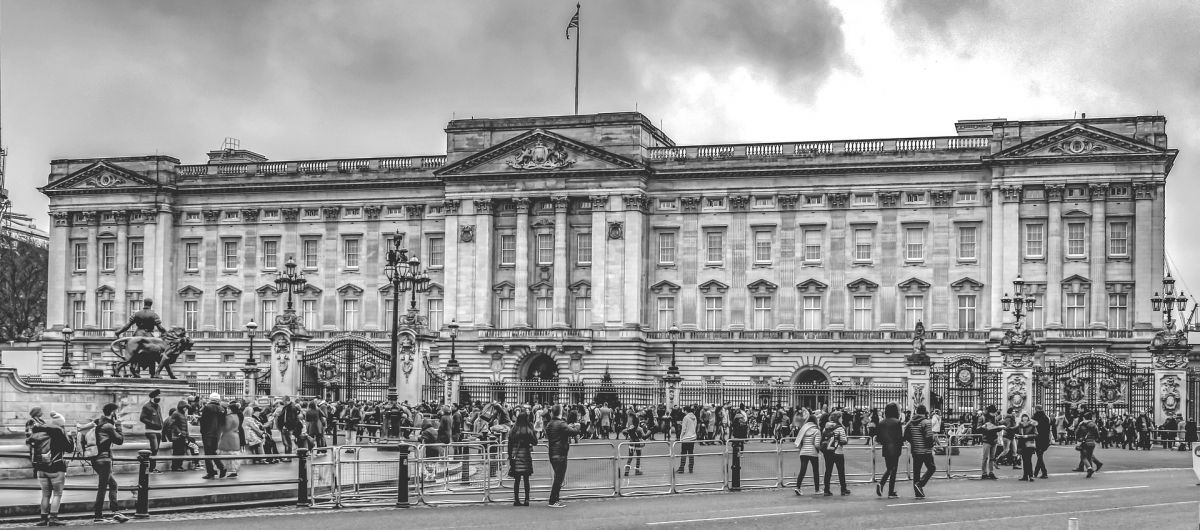
Also in 2021, using newly released documents from the Royal Archives, writer Andrew Roberts presented a new view of George III, the much-disparaged English language king during the American Revolution, highlighting his longstanding opposition to slavery. He never owned slaves and supported legislation abolishing the slave trade in England in 1807 -- 41 of 56 men who signed the Announcement of Independence were slave owners.
The death of Queen Elizabeth II, Oprah's interview and Roberts' book demonstrate that how our views of majestic people is complicated. In the following activities, you volition explore the modern-mean solar day media coverage of the Kings and Queens:
- Activity 1: Analyze Media Coverage of Harry and Meghan'south Interview with Oprah
- Activity two: Analyze Moving picture Trailers Most British Kings and Queens and American Presidents
Suggested Learning Activities
- Create a Counterfactual United States History using Jamboard or Canva
- Create a counterfactual history Jamboard or Canva presentation imagining what government and order would be like in the United states today if the authors of the Constitution fabricated the leader of the American government a King or Queen and non a President. Counterfactual history involves answering "what if" questions past imagining what might have happened differently if sure actions had occurred.
- Topics to consider as y'all blueprint your presentation:
- Would the Usa have a King or a Queen and a royal family? Would the White House be the abode of the monarchy?
- How much political ability would the King or Queen accept in relation to Congress and the Supreme Court? Would in that location be a Congress or Supreme Courtroom?
- What ceremonial roles would the monarchy perform in society?
- How would the King or Queen employ social media to share their views and policies with the nation?
- Write a People's History
- Why were some women and African Americans allowed to vote in New Jersey for a period of time after the American Revolution?
- Why were all women and African Americans then denied the right to vote?
- Blueprint a Promotional Flyer for a Northward American Colony
- Royal colonies were owned by the male monarch.
- Proprietary colonies, such every bit Pennsylvania, Maryland, and Delaware, were basically state grants from the British government.
- Self-governing colonies, including Rhode Isle and Connecticut, formed when the rex granted a charter to a articulation-stock company, and the company and so gear up its own authorities independent of the crown.
Online Resources for Authorities and Voting in Colonial America
- Emergence of Colonial Governance offers a brief background on authorities in the xiii colonies.
- Voting in Colonial Virginia
- American Colonies for a comparative look at colonial governments in the colonies from teacher Greg Feldmeth, Polytechnic School, Pasadena, California.
- Book: The Final King of America: The Misunderstood Reign of George III. Andrew Roberts. New York: Viking.
- Advantages and Disadvantages of Monarchy, Future of Working Web log (2022)
- Advantages of Disadvantages of Democracy, Future of Working Blog (2022)
- What Are the Advantages of a Constitutional Monarchy in the Great britain?
2.UNCOVER: Lucy Terry Prince, Anne Hutchinson and Mary Dyer: Women's Roles in Colonial America
In history and social studies classes, about simple and secondary schoolhouse students learn niggling about the roles and struggles of women in early American society. Although mostly invisible in history textbooks, noted one historian, "fine ladies, servant girls, blackness slave women, center class matrons, and native American women all contributed to the evolution of American life" (De Pauw, 1975, p. x). Later on all, about half of the colonial North America population were women.
Women lived in a patriarchal society. They had no rights, they could not vote, and they could not live on their own. Women had primary roles in kid-rearing and maintaining households, but that pic is far from consummate. "Women's work," noted Linda Grant De Pauw (1975, p. 3) consisted of v main areas of responsibleness: "feeding the family; manufacturing the family's clothing and such household essentials as candles and lather; keeping the dwelling, the family, and the family's habiliment clean; serving as doctor, nurse and midwife. . .; and caring for children."
Women had central roles in every aspect of colonial life outside the abode as well. White women supported the businesses of their husbands, and "information technology was quite common for a widow to carry on the concern after her married man'due south expiry" (De Pauw, 1975, p. 26). Women on the island of Nantucket where men engaged in the whaling manufacture were away for years at a fourth dimension assumed leadership roles both in family and religious settings. Several 19th century female person activists including Lucretia Mott, Martha Coffin Wright, abolitionist Anna Gardner, and women's rights advocate Maria Mitchell "all trace their roots back to the Nantucket Quaker meeting of the eighteenth century" (Kovach, 2015, p. viii).
The Women's Museum of California has short summaries of several notable women in colonial America, including Anne Hutchinson (discussed below), Mary Chilton (first person off the Mayflower), Anne Bradstreet (first published American poet), Mary Dyer (Quaker martyr and discussed beneath) and Mary Rowlandson (writer).
Lucy Terry Prince
As an infant, Lucy Terry Prince was taken from her family in Africa and brought first to Rhode Island and then Massachusetts where she was sold in slavery. In 1746, while still an enslaved woman in Deerfield, Massachusetts, Lucy Terry Prince wrote the earliest known poem past a Black author in North America. The poem, Bars Fight, described a encarmine encounter between Native warriors and colonial settlers. It was sung or recited till published in 1855. It is the simply slice of her poetry writing that survives today. A book almost her verse and here life is subtitled Vocalizer of History.
But Lucy Terry Prince's story is almost more than than her writing. She subsequently married, gained her freedom, purchased land in Vermont with her married man, and raised six children, 2 of whom served in the American Revolution. In 1803, she successfully argued a instance before the Vermont Supreme Court. She died in 1821 at age 97.
You lot can view a short video summary of her life hither.
Anne Hutchinson
Anne Hutchinson was born in Alford, England in 1591. She emigrated to the Massachusetts Bay Colony in 1634 where she became a religious dissenter and advocate for women in challenging male authority. Through a series of meetings among women in her abode, she openly questioned Puritan beliefs about salvation and religious police force.
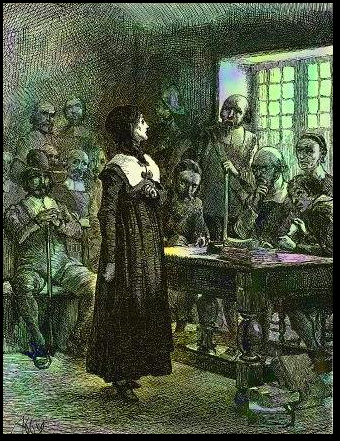
Anne Hutchinson on Trial
by Edwin Austin Abbey, Public Domain
In 1638, following a trial equally a heretic, she was banished to Rhode Isle on charges of blasphemy and sedition. She later on moved to the colony of New Netherlands (now New York) and was killed during an Indian raid. Learn more from the National Women'south History Museum's Biography of Anne Hutchinson.
Mary Dyer past Sylvia Shaw Judson | Public Domain
Mary Dyer
Mary Dyer, a friend of Anne Hutchinson, was also a religious dissenter, openly advocating the teachings of the Club of Friends or Quakers in opposition to the prevailing religious views of the rulers of the Massachusetts Bay Colony. Like Anne Hutchinson, Mary Dyer held that God spoke directly to individuals, a view that directly challenged the authority and power of the clergy. In 1656, the colony passed a police banishing Quakers from Massachusetts (a second law added that those who returned to the colony later on being banished were to exist put to death). Dyer, who returned to the colony in 1660 afterward existence banished was executed after refusing to acknowledge the authority of the law (Bremer, 2012). A statue of Mary Dyer can be constitute in front of the Massachusetts land capitol in Boston.
The stories of Anne Hutchinson and Mary Dyer (forth with that Roger Williams who was likewise banished from Massachusetts for his religious views) open a written report of the role of dissent in American history and regime. Hutchinson and Dyer'south dissents were religious, but the principle of the dissent rests on the willingness of individuals to oppose laws and practices they believe are wrong. Political dissent has been powerful force for change in United States history, but information technology is often under taught in schools, especially when the dissenters were women. Only the examples of the women'due south suffrage and women'southward rights movement, the roles of Harriet Tubman, Claudette Colvin, Sylvia Mendez in the struggle for ceremonious rights, and the efforts of Mother Jones, Margaret Sanger, Helen Keller, Alice Paul, and Dolores Huerta - to name merely a few - reveal the legacy of dissent that followed from efforts of two colonial women who refused to have the status quo in their society.
Looking at the United States today, what is your definition of dissent? There is more than nearly dissent and protestation in Topic 4/The Role of Political Protest of this book.
Suggested Learning Activities
- Create a Anne Hutchinson Biography Affiche
- Ann Hutchinson and Courage: In the Confront of Adversity, Voices of History, Pecker of Rights Institute
- Religious Dissent, The Huntington Library
- Anne Hutchinson: Religious Dissident
- Stage a Mock Trial
- The Trial of Anne Hutchinson (1637) using materials from the Famous Trials website
- Trial and Interrogation of Anne Hutchinson from Swarthmore College
- Reader's Theatre: The Trial of Anne Hutchinson, Huntington Library
- The Trials of Mary Dyer (1659 & 1660), Famous Trials website
- State Your View
- Why is dissent important?
- Do people in the United states have the right to dissent?
- Design Your Plan for Dissent
- Would words or actions be well-nigh of import?
- Would you speak out in public, march in protest, share your thoughts in writing or songs or videos, alter your hairstyle or the way you wearing apparel, or take some other actions?
Online Resources for Anne Hutchinson and Women's Roles in Colonial America
- Anne Hutchinson from the Elizabeth A. Sackler Centre for Feminist Art, Brooklyn Museum
- Principal SOURCE: Gender and Opportunity in Colonial America, California Country University Long Embankment
- Early Colonial Gender Roles, Teaching LGBTQ History
- Religious Dissent, Huntington Library
- Dissent and Republic in Modern American History, The Newberry
iii.Appoint: At What Age Should Teenagers (sixteen-Year-Olds and/or 17-Twelvemonth-Olds) Be Immune to Vote?
Passed and ratified in 1971, the 26th Amendment to the Constitution gives eighteen-year-olds the right to vote in country and federal elections. Many people now support lowering the voting age to xvi or 17 for state and local elections or, in some cases, but local elections. Takoma Park, Maryland was the first urban center to lower the voting age to 16 in local elections in 2013. In 2020, San Francisco narrowly passed Suggestion G, condign the commencement major city to extend the voting historic period to xvi for local elections and ballot measures.
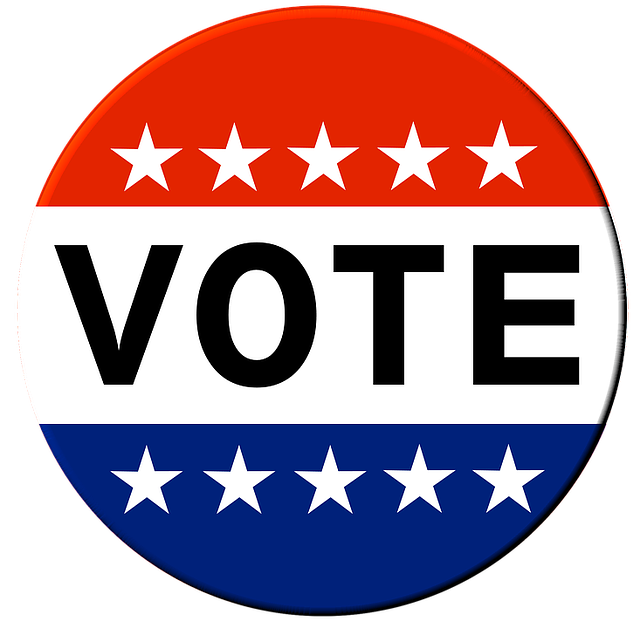
A lower voting age is seen equally a way to encourage greater participation by young people in political and civic matters. Opponents of the idea cite the immaturity of youth as a drawback to informed controlling as voters.
A number of states allow xvi-twelvemonth-olds or 17-year-olds to vote in congressional or presidential primaries. Around the world, 16-twelvemonth-olds tin vote in Austria, Brazil, Cuba, Nicaragua, the islands of Bailiwick of jersey and Guernsey and the Isle of man; 17-year-olds can vote in Indonesia, Democratic people's republic of korea, the Seychelles, and Sudan the Timor-Leste.
Massachusetts Congresswoman Ayanna Pressley has introduced legislation allowing youth as young as 16-years-former to vote for members of Congress and the President.
The Census Bureau reported that at that place were 42 one thousand thousand adolescents between 10 and nineteen in the U.South. in 2016, a number that is projected to abound to nigh 44 million past 2050. How might the nation'southward political dynamics change if going forward 16-twelvemonth-olds and/or 17-year-olds could vote?
Suggested Learning Activities
- Dialog and Argue: Should the voting age be lowered in the U.Southward.?
- Watch this video: Should 16-Year-Olds Be Immune to Vote? | Above the Noise.
- Then, discuss:
- What are the arguments in favor of, and confronting, lowering the voting age to xvi or 17?
- Will a lower voting age create greater political interest and civic involvement among young people?
- Would you support lowering the historic period requirement for being elected as a fellow member of Congress, a state office, or President?
Resources
- Lower the Voting Age for Local Elections, FairVote
- Why Is the Voting Age 18? CBS8, San Diego
- Should 16-Twelvemonth-Olds be Allowed to Vote? PBS Newshour
Standard 4 Decision
Investigate explored the beginning steps of self-regime by European colonists that included important founding documents (The Mayflower Compact), political institutions (colonial legislative assemblies), and decidedly undemocratic practices (simply men could vote and slavery was legal). Uncover focused on Anne Hutchinson, a religious dissenter who was banished from the Massachusetts Bay Colony for questioning the potency of the Puritans.Engage asked should 16-year-olds and 17 year-olds exist immune to vote in local and state elections?
English Influences On American Government,
Source: https://edtechbooks.org/democracy/britishinfluence
Posted by: urestiboure1963.blogspot.com


0 Response to "English Influences On American Government"
Post a Comment